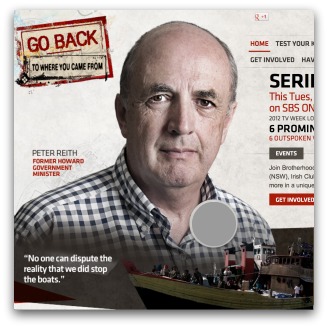Go Back to Where You Came From. Tuesday 28, Wednesday 29 and Thursday 30 August. 8:30pm on SBS ONE
 They stop short of calling it Go Back to Where You Came From: Celebrity Edition, but they needn't bother. The second season of SBS television's 'refugee journey in reverse' reality TV series replaces the 'ordinary' Australians of last year's inaugural season with six 'prominent' Australians, with divergent views about Australia's border protection policies.
They stop short of calling it Go Back to Where You Came From: Celebrity Edition, but they needn't bother. The second season of SBS television's 'refugee journey in reverse' reality TV series replaces the 'ordinary' Australians of last year's inaugural season with six 'prominent' Australians, with divergent views about Australia's border protection policies.
They include former rock star and aspiring politician Angry Anderson; actress and supermodel Imogen Bailey; former Howard minster Peter Reith; outspoken journalist and comedian Catherine Deveny; former 2UE and 4BC 'shock jock' Michael Smith; and Allan Asher, the former ombudsmen who resigned in 2011 after revelations he provided Greens Senator Sarah Hanson-Young with questions to ask him during a Senate committee hearing regarding problems with detention centres.
It's hard to escape the view this is a cynical exercise on the part of SBS, and the show's production company Cordell Jigsaw. Series one was a bona fide 'conversation starter' but also a ratings boon. Its sizeable multi-platform approach enlivened the debate through a vigorous social networking component. Whatever its flaws, his was about ordinary Australians watching ordinary Australians whose experiences both illuminated and challenged their own values and prejudices.
Two episodes in, series two seems more interested in conflict and drama than illumination.
This is best epitomised by the pairing of Deveny with Reith, whom the forthright journo scorns for his role in the Tampa crisis in 2001 and in the construction of the original Pacific Solution. Deveny is knowledgeable about the issues but her style is belligerent to say the least. She pays Reith due respect for being willing to partake in the journey, but what she calls 'robust debate' between the two is better described as aggression both passive and active. There's not much insight to be gained from watching these two snipe at each other, fun as it may be.

The producers also waste no time ramping up the sense of peril confronting the 'celebrities'. In the first episode, after visiting local Afghani and African refugees living in the community, the participants are immediately flown either to Kabul in Afghanistan or to Mogadishu, the capital of Somalia. Breaking from the strict 'journey in reverse' formula allows the producers to cut quickly to footage of the nervous participants clad in armoured vests as they are driven through war-torn streets, ever mindful of the proximity of bombs and gunfire.
This is edge-of-your-seat television. And it arguably is a more effective means of shaking the participants' prejudices, juxtaposing so explicitly the lives of refugees living in the destination country of Australia, with the dire state of affairs in their country of origin. But it also conjures up images of emphatic television producers sitting around a table as they opine: 'It's the sequel, so we need more action, and we need to get there faster!'
More encouraging is how the series allows some of the participants to transcend easy labelling. Bailey's reflections on having been in a long-term relationship with a devout Muslim man, and of experiencing 'reverse racism' as 'the only Australian in the room' on social occasions, suggests she is more than merely a bleeding heart on this issue. Her views have some substance, even if they are vaguely and weepily expressed.
By the same token, Smith, whose particular beef is with 'illegal' entrants and the 'gravy train' they provide for refugee lawyers, is shown interacting easily with children in Mogadishu, displaying digital photos of his own children and hoisting one young Somalian to his shoulders with avuncular glee; whatever his political prejudices, he encounters them simply as human beings, while Bailey can only stand aside looking overwhelmed.
This acknowledgement of human complexity is more heartening. Problematic legislation enacted in the wake of the Houston Report highlights the fact that these are issues that we need to continue talking about. If the primary goal of Go Back to Where You Came From is to help stimulate this conversation, then it needs to be a conversation of substance, with the inherent dignity of all human beings at its core, and not one characterised by the cynical and even puerile elements that have marked other aspects of the series so far.
 Tim Kroenert is Assistant Editor of Eureka Street.
Tim Kroenert is Assistant Editor of Eureka Street.